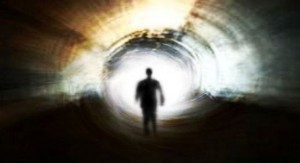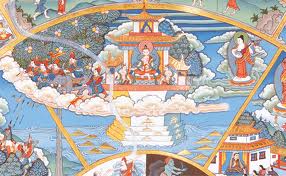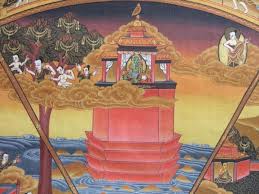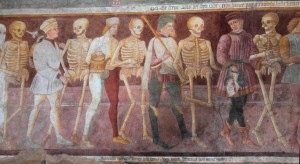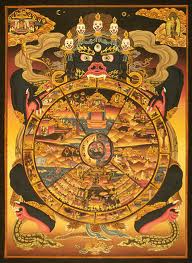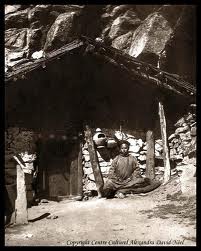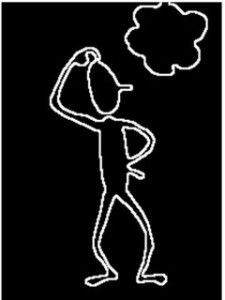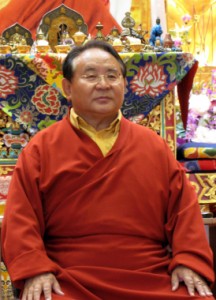
The following is respectfully quoted from “The Tibetan Book of Living and Dying” Sogyal Rinpoche:
GIVING HOPE AND FINDING FORGIVENESS
I would like to single out two points in giving spiritual help to the dying: giving hope, and finding forgiveness.
Always when you are with a dying person, dwell on what they have accomplished and done well. Help them to feel as constructive and as happy as possible about their lives. Concentrate on their virtues and not their failings. People who are dying are frequently extremely vulnerable to guilt, regret, and depression; allow the person to express these freely, listen to the person and acknowledge what he or she says. At the same time, where appropriate, be sure to remind the person of his or her buddha nature, and encourage the person to try to rest in the nature of mind through the practice of meditation. Especially remind the person that pain and suffering are not all that he or she is. Find the most skillful and sensitive way possible to inspire the person and give him or her hope. So rather than dwelling on his or her mistakes, the person can die in a more peaceful frame of mind.
To the man who cried out: “Do you think God will ever forgive me for my sins?” I would say, “Forgiveness already exists in the nature of God; it is already there. God has already forgiven you, for God is forgiveness itself. ‘To err is human, and to forgive divine.’ But can you truly forgive yourself? That’s the real question.
“Your feeling of being unforgiven and unforgivable is what makes you suffer so. But it only exists in your heart or mind. Haven’t you read how in some of the near-death experiences a great golden presence of light arrives that is all forgiving? And it is very often said that it is finally we who judge ourselves.
“In order to clear your guilt, ask for purification from the depths of your heart. If you really ask for purification, and go through it, forgiveness will be there. God will forgive you, just as the father in Christ’s beautiful parable forgives the prodigal son. To help yourself to forgive yourself, remember the good things you have done, forgive everyone else in your life, and ask for forgiveness from anyone you may have harmed.”
Not everyone believes in a formal religion, but I think nearly everyone believes in forgiveness. You can be of immeasurable help to the dying by enabling them to see the approach of death as the time for reconciliation and reckoning.
Encourage them to make up with friends or relatives, and to clear their heart, so as not to keep even a trace of hatred or the slightest grudge. If they cannot meet the person from whom they feel estranged, suggest they phone them or leave a taped message or letter and ask for forgiveness. If they are suspect that the person they want to pardon them cannot do so, it is not wise to encourage them to confront the person directly; a negative response would only add to their already great distress. And sometimes people need time to forgive. Let them leave a message of some kind asking for forgiveness, and they will at least die knowing that they have done their best. They will have cleared the difficulty or anger from their heart. Time and time again, I have seen people whose hearts have been hardened by self-hatred and guilt find, through a simple act of asking pardon, unsuspected strength and peace.
All religions stress the power of forgiveness, and this power is never more necessary, nor more deeply felt, than when someone is dying. Through forgiving and being forgiven, we purify ourselves of the darkness of what we have done, and prepare ourselves most completely for the journey through death.
FINDING A SPIRITUAL PRACTICE
If your dying friend or relative is familiar with some kind of meditation practice, encourage him or her to rest in meditation as much as possible, and meditate with the person as death approaches. If the dying person is at all open to the idea of spiritual practice, help the person find a suitable, simple practice, do it with him or her as often as possible, and keep reminding the person gently of it as death nears.
Be resourceful and inventive in how you help at this crucial moment, for a great deal depends on it: The whole atmosphere of dying can be transformed if people can find a practice they can do wholeheartedly before and as they die. There are so many aspects of spiritual practice; use your acumen and sensitivity to find the one they might be most connected with: it could be forgiveness, purification, dedication, or feeling the presence of light or love. And as you help them begin, pray for the success of their practice with all your heart and mind, pray for them to be given every energy and faith to follow the path they choose. I have known people even at the latest stages of dying make the most startling spiritual progress by using one prayer or mantra or one simple visualization with which they really made a connection in their heart.
Stephen Levine tells the story of a woman he was counseling who was dying of cancer. She felt lost because, although she had a natural devotion to Jesus Christ, she had left the church. Together they explored what she might do to strengthen that faith and devotion. She came to the realization that what would help her renew her connection with Christ, and to find some trust and confidence while dying, would be to repeat continuously the prayer, “Lord Jesus Christ, have mercy on me.” Saying this prayer opened her heart, and she began to feel Christ’s presence with her at all times.
THE ESSENTIAL PHOWA PRACTICE
The most valuable and powerful of all practices I have found in caring for the dying, one which I have seen an astonishing number of people take with enthusiasm, is a practice of the Tibetan tradition called phowa (pronounced “po-wa”), which means the transference of consciousness.
Phowa for dying people has been performed by friends, relatives, or masters, quite simply and naturally, all over the modern world–in Australia, America, and Europe. Thousands of people have been given the chance to die serenely because of its power. It gives me joy to make the heart of phowa practice now available to anyone who wishes to use it.
Practice One
First make sure you are comfortable, and assume the meditative posture. If you are doing this practice as you are coming close to death, just sit as comfortably as you are able, or practice lying down.
Then bring your mind home, release and relax completely.
1. In the sky in front of you, invoke the embodiment of whatever truth you believe in, in the form of radiant light. Choose whichever divine being or saint you feel close to. If you are a Buddhist, invoke a buddha with whom you feel and intimate connection. If you are a practicing Christian, feel with all your heart the vivid, immediate presence of God, the Holy Spirit, Jesus, or the Virgin Mary. If you don’t feel linked with any particular spiritual figure, simply imagine a form of pure golden light in the sky before you. The important point is that you consider the being you are visualizing or whose presence you feel is the embodiment of truth, wisdom, and compassion of all the buddhas, saints, masters, and enlightened beings. Don’t worry if you cannot visualize them very clearly, just fill your heart with their presence and trust that they are there.
2. Then focus your mind, heart, and soul on the presence you have invoked and pray:
Through your blessing, grace, and guidance, through the power of the light that streams from you:
May all my negative karma, destructive emotions, obscurations, and blockages be purified and removed.
May I know myself forgiven for all the harm I may have thought and done,
May I accomplish this profound practice of phowa, and die
a good and peaceful death,
And through the triumph of my death, may I be able to benefit all
other beings, living or dead.
3. Now imagine that the presence of light you have invoked is so moved by your sincere and heartfelt prayer that he or she responds with a loving smile and sends out love and compassion in a stream of rays of light from his or her heart. As these touch and penetrate you, they cleans and purify all your negative karma, destructive emotions, and obscurations, which are the cause of suffering. You see and feel you are totally immersed in light.
4. You are now completely purified and completely healed by the light streaming from the presence. Consider that your very body, itself created by karma, now dissolves completely into light.
5. The body of light you are now soars up into the sky and merges, inseparably, with the blissful presence of light.
6. Remain in that state of oneness with the presence for as long as possible.
